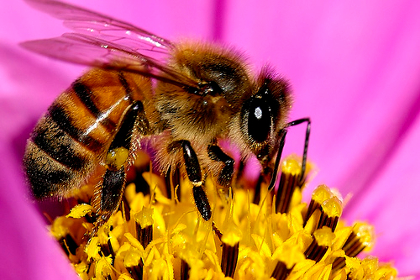
Experts Urge Federal Task Force: Listen to Science. Ditch Neonics
Over 100 scientists and researchers have urged a federal task force to take immediate action on bee-harming pesticides.
The scientists write that documented bee declines "are not sustainable," and stress that the pollinators play a crucial role "in our agricultural system and economies." They worte that beekeepers in the nation have been hit with average losses of nearly 30 percent for the past eight years and protecting the pollinators means listening to a body of scientific evidence that links a class of pesticides called neonicotinoids, or neonics, with lethal and sub-lethal harm to bees.
November 25, 2014 | Source: Common Dreams | by Andrea Germanos
For related articles and more information, please visit OCA's Genetic Engineering page, Millions Against Monsanto page and our Honey Bee Health page.
Over 100 scientists and researchers have urged a federal task force to take immediate action on bee-harming pesticides.
In a letter (pdf) dated Monday and sent to U.S. Department of Agriculture head Tom Vilsack and Environmental Protection Agency chief Gina McCarthy, the scientists write that documented bee declines "are not sustainable," and stress that the pollinators play a crucial role "in our agricultural system and economies."
Beekeepers in the nation have been hit with average losses of nearly 30 percent for the past eight years, they write to Vilsack and McCarthy, who lead the months-old Pollinator Health Task Force.
Protecting the pollinators, they write, means listening to a body of scientific evidence that links a class of pesticides called neonicotinoids, or neonics, with lethal and sub-lethal harm to bees.
Neonics are persistent and systemic, the experts write, creating multiple paths of exposure, including from dust, pollen, or water droplets from treated plants, for bees to the pesticides.
The letter references a global analysis based on 800 peer-reviewed reports called the Worldwide Integrated Assessment of the Impact of Systemic Pesticides on Biodiversity and Ecosystems (WIA), which focused on neonics and found "clear evidence" that they posed threats to bees. In addition to studies linking neonics to harm to bees, the scientists note in the letter, research has also pointed to questionable efficacy of neonics on crop yields and production.
"The President's Task Force should listen to the body of science that links pesticides to bee harm and bee declines," stated letter signatory Jim Frazier, PhD, an emeritus entomology professor at Pennsylvania State University and commercial beekeeper advisor who specializes in chemical ecology.
